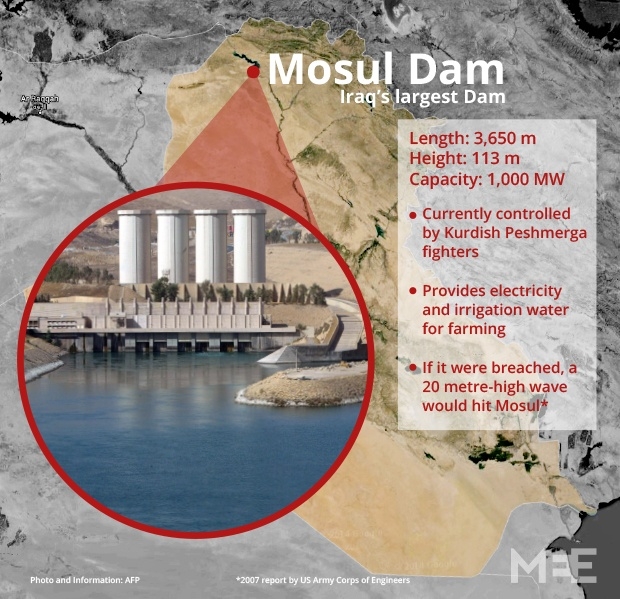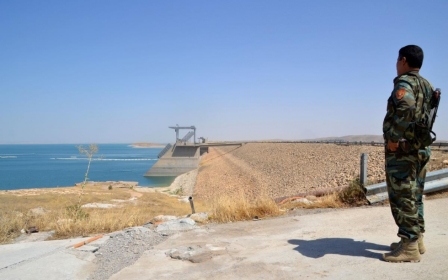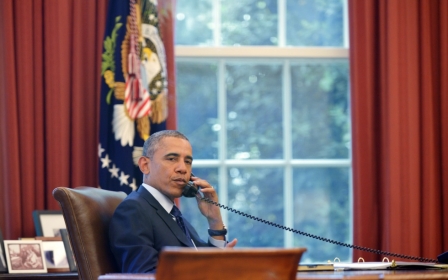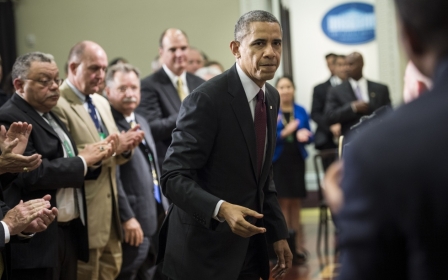Obama vows 'long-term' IS strategy as Iraq strikes continue
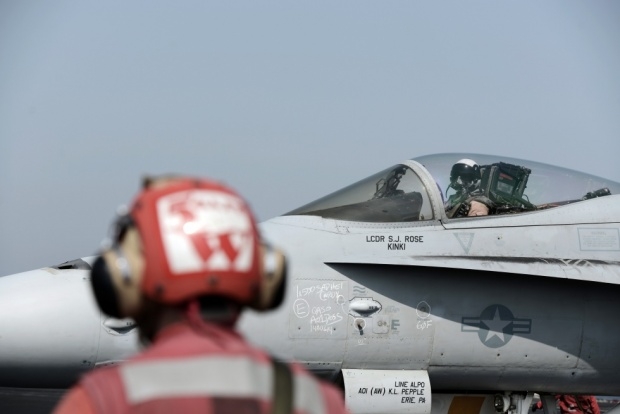
President Barack Obama said Monday that the United States has embarked on a long-term mission to defeat the insurgents of the so-called "Islamic State" fighting in Iraq.
"We will continue to pursue a long-term strategy to turn the tide against ISIL by supporting the new Iraqi government and working with key partners in the region," Obama said, using another acronym by which the group is known.
Meanwhile, US warplanes and drones carried out 15 airstrikes on Monday against Islamic State (IS) militants battling for control of a major dam in northern Iraq, the military said.
Fighter jets, bombers and unmanned planes destroyed nine IS positions and eight vehicles around the Mosul dam, where insurgents are fighting Kurdish forces, US Central Command said.
The US military launched a wave of airstrikes in northern Iraq just over a week ago with the stated aim of protecting a group of Yazidi minority refugees and preventing an IS advance on the city of Erbil.
President Barack Obama said last week that the siege of the Yazidi civilians has been broken, but strikes have only intensified as US-backed Kurdish and Iraqi forces try to secure the key dam.
"Since 8 August, US Central Command has conducted a total of 68 airstrikes in Iraq. Of those 68 strikes, 35 have been in support of Iraqi forces near the Mosul Dam," the statement said.
Monday's barrage destroyed nine IS fighting positions and a checkpoint, six armed trucks, an armoured vehicle, a mobile anti-aircraft gun and a patch of ground booby-trapped with improvised explosives.
Central Command said the strikes had been conducted under the authority of Obama's order to support Iraqi and Kurdish forces in the fight against IS militants and to protect US personnel and facilities.
International community determined to help Iraq
Britain is stepping up its role in Iraq beyond a humanitarian mission and the involvement is set to last months, Defence Minister Michael Fallon said in comments published Monday.
"This is not simply a humanitarian mission," Michael Fallon said in comments run in The Times newspaper.
"We and other countries in Europe are determined to help the government of Iraq combat this new and very extreme form of terrorism that ISIL (Islamic State) is promoting."
Speaking to RAF pilots and other service personnel during a visit to a RAF base in Cyprus, the British defence minister said "there may well now be in the next few weeks and months other ways that we may need to help save life (and) protect people and we are going to need all of you again," The Guardian daily reported.
A spokesman for the defence ministry confirmed the comments.
However, the spokesman noted that Fallon had spoken on Saturday, before the release of comments by Prime Minister David Cameron that appeared to back some degree of military support but ruled out "sending armies to fight or occupy."
Britain's prime minister said Monday that "boots on the ground" would not return to Iraq, but the government would "look favourably" on a request by Kurdish forces for arms.
Speaking with the BBC, David Cameron said that "Britain is not going to get involved in another war in Iraq."
"We are not going to be putting boots on the ground. We are not going to be sending in the British Army," he added.
"My priority is to keep people safe here at home, that is my number one, two and three priority."
The prime minister told the BBC that Britain should use all of its assets to help, including its "military prowess."
Over the weekend, Cameron wrote in the Daily Telegraph newspaper that the Islamic State (IS) was a direct threat to the UK.
The State has proclaimed a "caliphate" that straddles parts of Syria and Iraq, and has driven an estimated 1.2 million Iraqis from their homes and has particularly targeted Turkmens, Yazidis, Shiite Muslims, and Christians.
Cameron said Monday that Britain would "look favourably" on a request by Kurdish forces for arms.
The UK has already delivered military equipment supplied by France to Kurdish fighters battling IS and The Times reported that a small number of British soldiers briefly went into the Kurdish region of northern Iraq last week to prepare for a possible deployment of Chinook helicopters to save members of the Yazidi religious minority from a mountainside.
Six Tornado jets and a spy plane had begun flying beyond the Kurdish region to provide information on extremists' movements that could be used in planning Iraqi military attacks in a "development that brings Britain closer to a direct combat role," the newspaper said.
IS seized control of the Northern Iraqi city of Mosul in June this year and has been advancing on other areas fighting both the Iraqi army and Kurdish forces.
New MEE newsletter: Jerusalem Dispatch
Sign up to get the latest insights and analysis on Israel-Palestine, alongside Turkey Unpacked and other MEE newsletters
Middle East Eye delivers independent and unrivalled coverage and analysis of the Middle East, North Africa and beyond. To learn more about republishing this content and the associated fees, please fill out this form. More about MEE can be found here.


